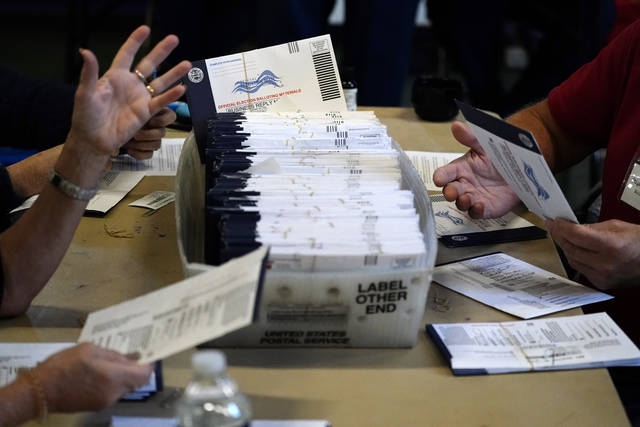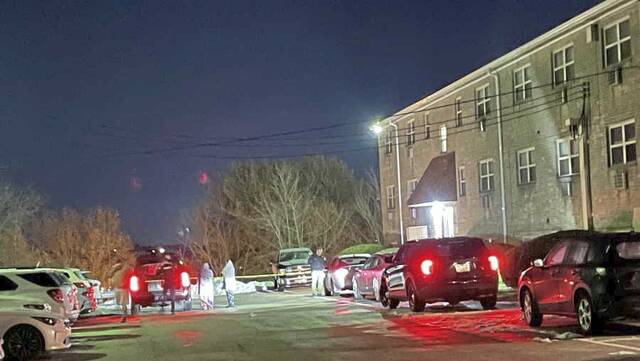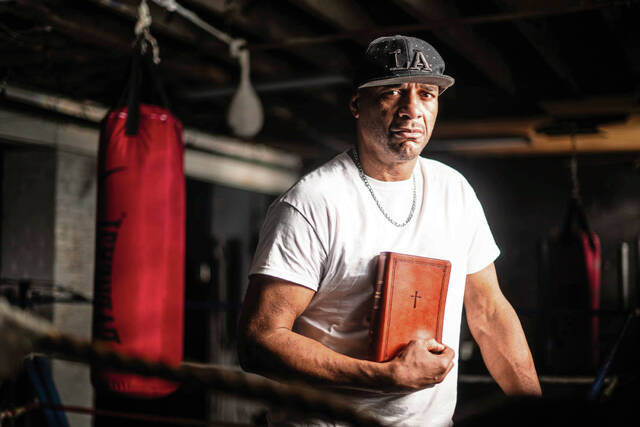Westmoreland County’s Republican commissioners on Friday declined to vote on the status of 343 mail-in ballots that were not properly dated and a separate batch of 375 ballots delivered to the courthouse by the Postal Service nine minutes after the 8 p.m. deadline on Election Day.
The move came during a meeting of the county’s Elections Board, which spent most of the day adjudicating challenges to provisional ballots cast at the polls last week.
Democratic Commissioner Gina Cerilli sought to include both the date-defective mail-in ballots that were cast on time and those that arrived minutes late due to what postal officials said was traffic congestion in Greensburg. Republicans Sean Kertes and Doug Chew declined to vote on both issues.
“At what point does an individual have to be responsible?” Chew asked, referring to mail-in ballots that were not properly dated when submitted by voters.
Cerilli pointed to a decision this week by the Democratic-led Allegheny County Elections Board to approve date-defective mail-in ballots and argued Westmoreland should reclassify ballots delivered to the courthouse minutes late Nov. 3 as being submitted on time.
Last month, the Pennsylvania Supreme Court ruled that all ballots postmarked by Nov. 3 and delivered before 5 p.m. Nov. 6, three days after the election, could be counted. Appeals courts have subsequently directed those late-arriving ballots be segregated and not included in official counts until legal challenges are resolved.
A federal court decision issued Friday allowed the votes to be counted, but additional appeals are expected.
In a heated exchange with the Republican commissioners, Cerilli accused postal officials of deliberately delaying delivery of some ballots and blasted Chew and Kertes for tabling her request they be counted.
“You are intentionally disenfranchising voters. Shameful,” Cerilli said.
Meanwhile, the board adjudicated a number of challenges lodged by the Trump campaign as well as from lawyers representing the Republican and Democratic state and county political committees. A handful of challenged ballots, initially rejected by bipartisan boards of reviewers based on technicalities such as the failing to seal outer and interior secrecy envelopes, were ruled eligible by the commissioners and will be counted.
About 200 provisional ballot challenges have been lodged so far, and most involved circumstances where voters claimed they were directed by county workers to sign poll books before casting their paper ballots. More than a dozen voters attended Friday’s daylong hearing, and many testified they had requested but not received mail-in ballots.
Officials said the signing of poll books indicated voters cast ballots on the touch-screen machines at each of the county’s 307 voting precincts. Voters claimed that, although they signed poll books, they did not cast ballots on voting machines.
Those cases will be resolved when the Elections Board reconvenes its hearings at 10 a.m. Monday. A list of voters scheduled for hearings is posted on the county’s website.
Officials said about 3,600 provisional ballots were cast on Election Day. As of Friday afternoon, less than half had been reviewed and none were counted. No reviews will be conducted over the weekend, and the work will resume Monday, commissioners said.
Work to review each of the provisional ballots by seven four-member bipartisan boards started this week but has been slowed by a coronavirus outbreak among Elections Bureau staff. A number of provisional board members quit Thursday after learning about the infections, and more resigned from their duties Friday when others complained that some of the volunteers were not properly wearing masks.
Commissioners appointed 17 new volunteers to serve on the provisional boards and approved several policies that require them to properly wear masks, barred face coverings with political messages and ordered volunteers adhere to state guidelines in making eligibility determinations for the ballots.








